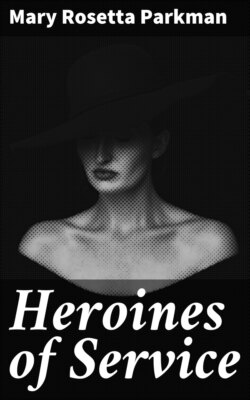Читать книгу Heroines of Service - Mary Rosetta Parkman - Страница 3
На сайте Литреса книга снята с продажи.
FOREWORD
ОглавлениеTable of Contents
From time immemorial women have been content to be as those who serve. Non ministrari sed ministrare—not to be ministered unto but to minister—is not alone the motto of those who stand under the Wellesley banner, but of true women everywhere.
For centuries a woman's own home had not only first claim, but full claim, on her fostering care. Her interests and sympathies—her mother love—belonged only to those of her own household. In the days when much of the labor of providing food and clothing was carried on under each roof-tree, her service was necessarily circumscribed by the home walls. Whether she was the lady of a baronial castle, or a hardy peasant who looked upon her work within doors as a rest from her heavier toil in the fields, the mother of the family was not only responsible for the care of her children and the prudent management of her housekeeping, but she had also entire charge of the manufacture of clothing, from the spinning of the flax or wool to the fashioning of the woven cloth into suitable garments.
Changed days have come, however, with changed ways. The development of science and invention, which has led to industrial progress and specialization, has radically changed the woman's world of the home. The industries once carried on there are now more efficiently handled in large factories and packing-houses. The care of the house itself is undertaken by specialists in cleaning and repairing.
Many women, whose energies would have been, under former conditions, inevitably monopolized by home-keeping duties, are to-day giving their strength and special gifts to social service. They are the true mothers—not only of their own little brood—but of the community and the world.
The service of the true woman is always "womanly." She gives something of the fostering care of the mother, whether it be as nurse, like Clara Barton; as teacher, like Mary Lyon and Alice Freeman Palmer; or as social helper, like Jane Addams. So it is that the service of these "heroines" is that which only women could have given to the world.
Many women who have never held children of their own in their arms have been mothers to many in their work. It was surely the mother heart of Frances E. Willard that made our "maiden crusader" a helper and healer, as well as a standard bearer. It was the mother heart of Alice C. Fletcher, that made that student of the past a champion of the Indians in their present-day problems and a true "campfire interpreter." It was the woman's tenderness that made Mary Slessor, that torch-bearer to Darkest Africa, the "white mother" of all the black people she taught and served.
The Russian peasants have a proverb: "Labor is the house that Love lives in." The women, who, as mothers of their own families, or of other children whose needs cry out for their understanding care, are always homemakers. And the work of each of these—her labor of love—is truly "a house that love lives in."
